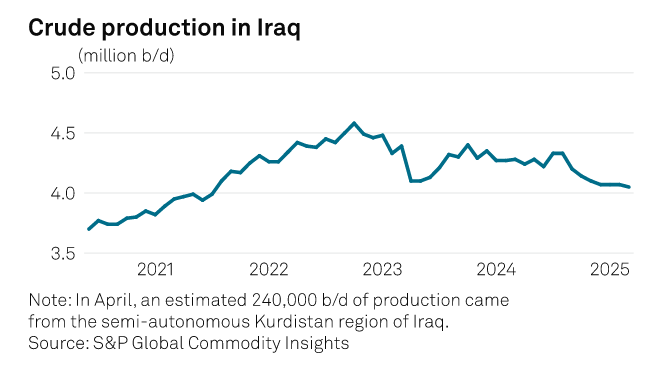Kurdistan oil, gas deals align with Trump's peace strategy: US Energy Secretary

US Energy Secretary Chris Wright said on May 22 two deals signed by US companies to develop oil and gas in the Kurdistan region of Iraq align with the administration's broader strategy of striking commercial deals with allies to counter Iran's influence.
"We want to embrace our allies in the region for commerce, alliance, progress ... and align together to end the menace that Iran has been in the region," Wright said at a Washington event hosted by the AL-Monitor Global Institute.
Wright repeatedly called this a "commerce, not conflict" policy, arguing that when companies and countries develop resources together, they have more peaceful relations.
The same strategy was on display in President Donald Trump's recent visit to the Middle East, Wright said. In addition to promoting peace, commercial deals in the Middle East also boost energy supplies worldwide and spur investment in the United States, he said.
Speaking of the Kurdistan region, Wright said, "I see great opportunity for American cooperation there, as evidenced by the signing of these two deals. And we would love to see that commercial relationship grow and flourish."
One deal was signed by US energy company HKN Energy and Dubai-based ONEX Group to develop the Miran Gas Field, and the other agreement was signed by US company WesternZagros to develop oil and gas in the Topkhana block.
The Miran field was previously expected to be developed by Genel Energy. Last month, Genel was ordered to pay nearly $27 million in legal costs to the KRG by an arbitration tribunal following a dispute over terminated contracts in the field. Genel has appealed the costs award to the High Court and has not paid anything to KRG, it said in an update on May 8.
The deals were announced during a trip to the US by Masrour Barzani, the prime minister of the Kurdistan Regional Government, or KRG. The trip aimed to promote cooperation between the US and Kurdistan.
"We are here to prove that Kurdistan is not only good in fighting terrorism with the allies, but it's also ready to build with allies so that we could serve our people and also the American investors who are wishing and willing to come to Kurdistan," Barzani said at the event.
The two deals will help produce more gas that can be used to generate electricity for the Kurdistan region and the rest of Iraq, which have faced power shortages, Barzani said.
The Trump administration has been trying to crack down on Iraqi imports of electricity from Iran. In March, the US announced it would not renew an existing waiver that temporarily allowed such imports.
Deal opposition
Iraq's Federal Ministry of Oil has rejected the two deals as a violation of Iraqi law. Baghdad insists that any upstream investments should be made through the federal government.
The contract spat between Kurdistan and the federal government in Iraq comes as both parties had been working toward resolving a dispute over pipeline exports.
A pipeline connecting Iraq and Turkey previously carried up to 400,000 b/d of medium sour Kurdish crude and 75,000 b/d of Kirkuk crude to the Mediterranean, but pipeline flows have been suspended since March 2023, when an arbitration court in Paris said Ankara had violated the pipeline agreement by allowing independent Kurdish sales.
Since then, KRG has continued to produce some 250,000 b/d of crude, much of it smuggled by truck into neighboring countries.
A deal on the pipeline resumption – the subject of ongoing talks between Baghdad, Erbil and Ankara – has focused on the amount paid per barrel by the federal government to the KRG for crude produced in the northern enclave.




